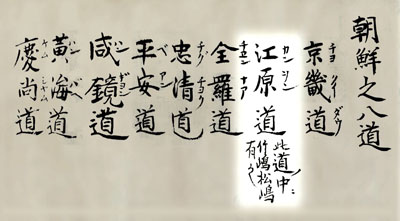- Dokdo in the East Sea
- Controversies surrounding Dokdo
- Ten Truths about Dokdo Not Known in Japan
Dokdo in the East Sea
Table of Contents Open Contents
- Ten Truths about Dokdo Not Known in Japan
- 1. Japan claims it has long recognized the existence of Dokdo.
- 2. Japan claims there is no evidence that Korea recognized the existence of Dokdo in the past
- 3. Japan claims that it established its sovereignty over Dokdo in the mid-seventeenth century.
- 4. Japan claims that it banned passage to Ulleungdo in the late seventeenth century, but did not ban passage to Dokdo
- 5. Japan claims that Ahn Yong-bok’s statement is not reliable
- 6. Japan claims Japan reaffirmed its intention to claim sovereignty over Dokdo by incorporating the island into Shimane Prefecture in 1905
- 7. Japan claims that while drafting the San Francisco Peace Treaty the United States suggested that Dokdo is under the jurisdiction of Japan
- 8. Japan claims the designation of Dokdo as a bombing range for military practice for the United States Forces in Japan shows that Dokdo was treated as part of Japan’s territory
- 9. Japan claims that the Republic of Korea is illegally occupying Dokdo
- 10. Japan claims although Japan proposed to the Republic of Korea to refer this dispute over Dokdo to the International Court of Justice, the Republic of Korea rejects doing so.
Japan claims that Ahn Yong-bok’s statement is not reliable
The deposition of Ahn Yong-bok, on which the Republic of Korea bases its claim, contains many points that conflict with factual evidence and that are not included in Japanese records.
Japan’s claims is not true because...
the deposition of Ahn Yong-bok is supported by Korean and Japanese documents.
Ahn Yong-bok’s work in Japan facilitated the development of state-level talks on Ulleungdo between Joseon and Japan, and eventually led Japan to recognize Ulleungdo and Dokdo as Korean territories. Despite slight differences in the records regarding Ahn’s activities between Joseon and Japan, it does not justify Japan’s assertion that Ahn’s statement is not credible.
-
※ Ahn’s activities in Japan are also recorded in important government publications of the Joseon government, including the Veritable Records of King Sukjong (Sukjong sillok), Diary of the Royal Secretariat (Seungjeongwon ilgi), and Reference Compilation of Materials on Korea (Dongguk munheon bigo) as well as in Japanese texts, including “Records on Takeshima” (Takeshima kiji), “Excerpts from The Record on the Background of the Passage to Takeshima” (Takeshima tokai yuraiki basho hikae), “Chronology of Inaba Province” (Inpu nenpyo), and “A Study of Takeshima” (Takeshima ko).
According to the “One Volume Memorandum Concerning the Korean Boat that Came Alongside the Pier in the Ninth Year of Genroku [1696]” (Genroku kyu heishi-nen Joseon fune chakugan ikkan oboegaki), Ahn Yong-bok argued that Takeshima [that is, Ulleungdo] and Matsushima [that is, Dokdo] are under the jurisdiction of Gangwon-do, in Joseon. This supports Ahn’s statement in the Veritable Records of King Sukjong. (See Material 8.)
Japan also cast doubts over Ahn’s report that he met Japanese fishermen in Ulleungdo in the fifth month of 1696 based upon the fact that the passage to the island was prohibited in the first month of 1696. However, the Edo Shogunate’s order banning Japanese passage to Ulleungdo, which was issued in the first month of 1696, was not immediately delivered to the Oya and Murakawa families. Joseon received that order in the tenth month of the same year. Thus, it is unreasonable to argue that Ahn’s statement is not reliable simply because the order prohibiting the passage to Ulleungdo was issued in the first month.
-
- MATERIAL 8. The oral report from “One-Volume Memorandum Concerning the Korean Boat that Came Alongside the Pier in the Ninth Year of Genroku [1696]”










